“Pitfall of Your Chosen Occupation: A Deep Dive into The Leftovers’ ‘International Assassin'” is a guest article from Grant Piercy
“In a universe suddenly divested of illusions and lights, man feels an alien, a stranger. His exile is without remedy since he is deprived of the memory of a lost home or the hope of the promised land. This divorce between man and his life, the actor and his setting, is properly the feeling of absurdity.” — Albert Camus (The Myth of Sisyphus, p. 6)
“The absurd is an experience that must be lived through, a point of departure…” — Albert Camus (The Rebel p. 4)
In 2015, The Leftovers, a show that had been struggling to find its audience since its premiere the year before, stunned audiences with one of the finest episodes of television ever. The eighth episode of its miraculous second season, “International Assassin” was a radical departure from its previous installments, exploring a purgatorial hotel where a character finds himself after apparently dying by poison an episode before. The episode had several precedents in fiction, not the least of which was the first series of the show’s creator, Damon Lindelof, who gained notoriety by spearheading LOST the decade prior. What Lindelof and his co-creators achieved with “International Assassin” is one of the most densely layered, philosophical hours of television in the history of the medium.
With the recent popularity of apocalyptic fiction like The Last of Us and the renewed argument of whether or not densely layered character studies constitute bottle episodes, “International Assassin” demands a deep dive examination of its themes, tropes, and intense character portrayal. In this essay, I’ll explore The Leftovers and this pivotal episode, which sets the pace for the remainder of the series, and take a look at just what was going on in that other-worldly hotel.
I Smoke to Remember
The Leftovers was based on a novel of the same name by author Tom Perrotta about the dissolution of a family after a worldwide, rapture-like phenomenon called “The Sudden Departure,” in which 2% of the world’s population disappeared. The book was an exploration of a world in which a sudden, global traumatic event occurred, examining social, religious, and psychological repercussions. The first season was a loose adaptation of the novel, in which a small town police chief tries to keep the peace between the denizens of his town and the Guilty Remnant, a cult that gained prominence in the wake of the Sudden Departure. The GR are portrayed as silent, chain-smoking loiterers who dress all in white, stalking potential members throughout town.
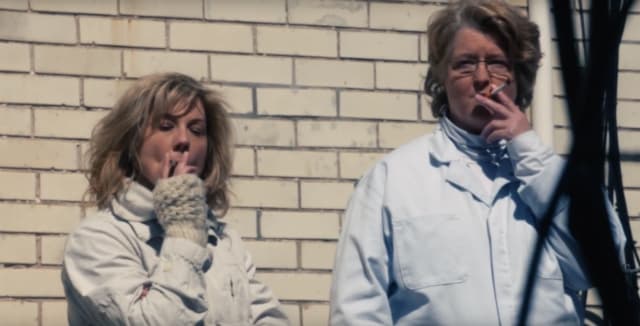
Over the course of the first season, the police chief, Kevin Garvey Jr. (portrayed by Justin Theroux) abducts the leader of the GR, Patti Levin (Ann Dowd), while sleepwalking. Patti subsequently kills herself in front of Kevin after failing to convince him to kill her. The experience haunts Kevin, who enlists the local reverend Matt Jamison (Christopher Eccleston) to bury her body. Kevin had been seeing Matt’s sister Nora (Carrie Coon), whose husband and children vanished in the Departure. The GR, including Kevin’s ex-wife Laurie (Amy Brenneman), enact a plan with catastrophic consequences, causing a riot in Kevin’s hometown of Mapleton. In the aftermath, Kevin finds Nora with a baby who had been left on his doorstep. (Whew, that’s a lot.)
In Season 2, the newly formed family unit of Kevin, Nora, his daughter Jill (Margaret Qualley), and the abandoned baby Lily, move to the town of Jarden, Texas, the only town in America verified to have zero departures. Kevin experiences what is dubbed “a psychotic break” in which he hallucinates Patti Levin, who follows and taunts him mercilessly. A local of Jarden, Virgil (Stephen Williams), claims that, in order to exorcise Patti, Kevin must do battle with her on her turf—meaning that Kevin will have to die to vanquish Patti’s ghost.
A lot of questions are raised in this situation: is Patti a ghost or a hallucination? What is Patti’s turf exactly and what are the terms of battle? How trustworthy is Virgil, who claimed to have vanquished an adversary of his own during a near-death experience?
Virgil presents Kevin with a cup of poison, claiming that he can be revived with a needle of epinephrine, and Kevin drinks. In a shocking moment, Kevin seizes and foams at the mouth, suffering some type of medical event. Virgil empties the needle on the floor and shoots himself in the head, committing suicide. Virgil’s grandson Michael (Jovan Adepo) drags Kevin’s body away to parts unknown.
Know First Who You Are
At the end of the previous episode, “A Most Powerful Adversary,” Kevin Garvey is dead, for all intents and purposes. We’ve seen this type of story before, where a protagonist must conquer a shadowy underworld before emerging reborn—it’s baked into the classical hero’s journey. The presence of a character named Virgil evokes Dante’s Inferno, where the poet Virgil acts as Dante’s guide through the nine circles of hell. But let’s look at a few direct television influences on Lindelof and his co-creators.
Since the early 1990s, it hasn’t been out of place for television characters to access some kind of liminal space, whether that be dreaming, an afterlife, or near-death experience, in which a morality play would commence up to a character either waking up or acknowledging the reality of the liminal space. This is mainly due to the highly influential series Twin Peaks, co-created by film auteur David Lynch and TV stalwart Mark Frost. Within the series, Special Agent Dale Cooper (Kyle MacLachlan) attempts to access such a space dubbed The Black Lodge to rescue his girlfriend Annie (Heather Graham) from his former partner, who is obsessed with this Black Lodge. The Lodge is characterized by flowing red curtains above a black and white chevron floor and inhabitants that speak backward. In the final episode of the original series circa 1990, Cooper battles this former partner Windom Earle (Kenneth Welsh) in the Lodge space, but must also contend with the villainous Killer BOB (Frank Silva), The Man from Another Place (Michael J. Anderson), and his own evil Doppelgänger, who ultimately escapes in his place, trapping Cooper for 25 years thereafter. Based on its handful of appearances, the Black Lodge could be considered a purely metaphysical place, somewhere behind the curtains of reality, that can reach out and influence the mechanics of the material world. One character describes it as a place all souls must pass through and face their shadow selves before moving on.
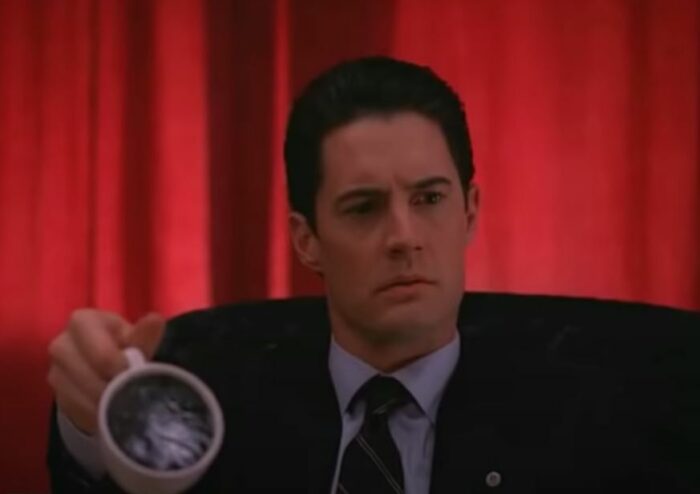
Another clear touch point is The Sopranos’ “Kevin Finnerty” storyline, which took place over the first three episodes of its sixth season. In that story, mob boss Tony Soprano (James Gandolfini) is shot and left in critical condition. While in a comatose state, Tony dreams himself as a mundane everyman named Kevin Finnerty, a precision optics salesman with no ties to the mafia. In this long form dream sequence, Finnerty acts as a counterpoint to Tony Soprano’s normal life of debauchery and crime. He wakes up in a hotel carrying another man’s briefcase, and numerous people confuse him with the “actual” Kevin Finnerty, the name itself a play on the word “infinity.” There’s a thread of questioning spirituality in this near-death experience—Finnerty encounters religious commercials, Buddhist monks, and a lighthouse off in the distance. Eventually, Tony refuses to go into the house of the dead, where his recently deceased cousin, Tony Blundetto (Steve Buscemi) invites him, and the voice of his daughter Meadow (Jamie-Lynn Sigler) calls him back to consciousness.
One important precursor to consider is the Flash-Sideways world of Lindelof’s previous series, LOST (heavy spoilers to follow). The Flash-Sideways, called such by Lindelof and fellow showrunner Carlton Cuse as a reference to the show’s former flashback/flash forward structure, is initially presented as an alternate timeline in which Oceanic 815 never crashed and its passengers went about their normal lives, with some differences to their normal background stories. Over the course of LOST’s final season, it’s revealed that the Flash-Sideways is a spiritual bardo (an intermediate, transitional state between death and rebirth) where the Oceanic survivors can reconnect in the afterlife before moving on to the next phase of existence, whatever that may be. Each character must face “the clear light of reality,” waking up from their bardo life to remember their actual lives and accept the fates they couldn’t change. The final season is often maligned in pop culture partially for its perceived unreality, but further examination reveals a startling representation of Tibetan Buddhist concepts from the Bardo Thodol (The Book of the Dead).
We can also draw parallels between Kevin Garvey and LOST’s protagonist Jack Shephard (Matthew Fox), a character with a toxic hero complex stemming from father issues. The Flash-Sideways is often misinterpreted as purgatory, but purgatory is a place to purge one’s sins; rather, this is a place between one life and the next, whatever that next is, in which someone can experience karmic hallucinations that will eventually result in rebirth, or where they can experience “the clear light of reality” (the moment of death).
The karmic hallucinations are an important point in the Flash Sideways that help the Oceanic survivors gain acceptance, peace, and grace. Kate Austen (Evangeline Lily) is able to find something more important than running, John Locke (Terry O’Quinn) is able to finally come to grips with his disability, Jack Shephard is able to put his father issues behind him by becoming a father himself; Sawyer (Josh Holloway) realizes his lifelong pursuit of revenge is hollow and empty; Hurley (Jorge Garcia) sees the good he can bring to the world through his fortune. These aren’t just entertaining what-if scenarios—they function to complete the characters and cease their suffering when they finally see the clear light of reality—that they are dead, their past is over and gone, and it’s time to find out what’s next.
The James Bond Thing
“International Assassin” opens with a bathtub filled to its edge. Ripples of water reveal a choking Kevin Garvey, who immediately slips out of the tub onto his stomach, as though he were being born into this new state of existence. He is naked and confused, reaching for a white towel. It’s important to note the color of the towel with which he shields his nakedness; white represents the nihilism of the Guilty Remnant. We can hear the low, ambient white noise of the hotel’s HVAC system, contributing to the disorientation of the scene. Kevin stands, covering his lower half with the towel, and stares directly out at the audience, a fearful glimmer in his eyes.
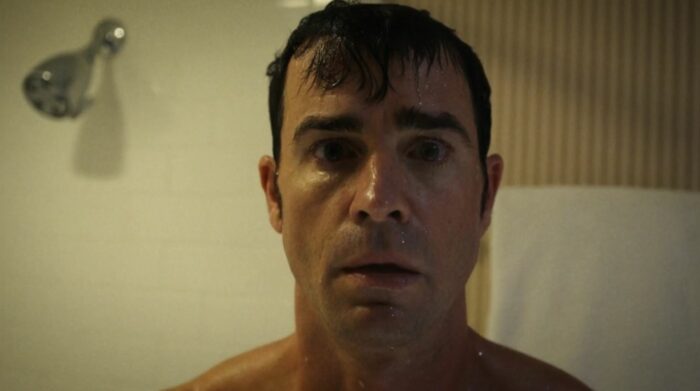
This episode was written by Lindelof and Nick Cuse, the son of his former co-showrunner on LOST, and directed by Craig Zobel. According to Lindelof, the idea for the episode originated with consulting producer Reza Aslan’s assertion that Kevin was a shaman, and that shamans have to die. “They have to go to the other side. And when they come back to life that’s when they have their powers,” said Lindelof in a 2016 interview with Slashfilm.
“We know that, emotionally, the end result of this episode, the only way that Kevin can vanquish Patti is by understanding and sympathizing and empathizing with her. It’s that thing that goes all the way back to Anakin, which is, ‘Oh, the villain was a child once, too.’ Like, this person is broken. And only through understanding Patti can Kevin let her go, because the reason she killed herself in Season 1 was she’s like, ‘You Understand, Kevin.’ He didn’t. Kevin has to understand her.”
So the stage was set, Kevin had to die to vanquish Patti from his mind. But what were the rules that would govern this battle and this liminal space? It was Cuse who suggested that Kevin would literally have to assassinate his adversary. “I’m so into the James Bond thing,” Cuse said in a 2017 interview with Vulture. “Maybe it was inspired by those movies, and by wanting to be an international assassin myself… But these are the things that Kevin wants—to be a lone gun, important but untied to everyone else.”
I also want to note the brief glimpse out at the audience. In the previously mentioned Slashfilm interview, Lindelof says, “We talked about all different versions of what Kevin’s walk through the afterlife looked like and none of them were clicking. They all felt very obvious and dreamlike. They didn’t feel like they had any kind of sense of humor to them or self-awareness. They felt very tropey.” Whereas in Lindelof’s previous excursion into the afterlife, LOST, we didn’t know we were in an afterlife; in this episode, we know it from the jump, and Kevin Garvey staring out at the audience feels almost like a wink of self-awareness on the part of the show’s creators.
Adorn Yourself Accordingly
After staring out at the audience for the briefest of moments, we understand that Kevin is really looking at himself in a full length mirror. This was also a common motif in the Flash-Sideways of LOST—the character who is the subject of the episode facing their reflection. Kevin is supposed to reflect on his identity to gain a deeper understanding of himself. However, since the beginning of the season, and perhaps the very beginning of the show, Kevin has been undergoing an identity crisis.
In the early days back in Mapleton, Kevin Garvey had been a police chief, a soldier of order, attempting to keep the peace between the townsfolk and the Guilty Remnant. Before the Sudden Departure, he’d been a family man, but one bristling against the constraints of his marriage. At the time of the Departure, he’d been engaging in an extra-marital sexual encounter with a woman he’d just helped based on his position as chief. She disappeared during the act, ensuring he’d never face the consequences of such an encounter. Indeed, much of Kevin’s character up to this point has been about escaping consequences and feeling deep-seated guilt about his actions. Patti herself could be interpreted as a guilty remnant—Kevin’s desire to blow up his life and destroy his family unit; he sleepwalks often, and engages in kidnapping the real-life Patti, which results in her death by suicide.
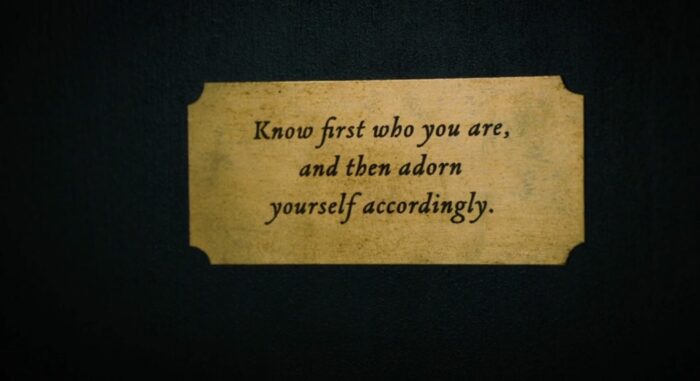
When he’s in the newly formed family unit with Nora, Jill, and Lily is when he sees Patti more and more. On the one hand, Kevin embraces these new family mechanics with Nora and Jill. He confesses to them what happened with Patti and initially feels unburdened, but as time goes on, he sees and hears her ghost. He digs up her corpse and gets himself pulled over, telling the arresting officer he has a body in the back of his truck. He wants the consequences, because maybe they will alleviate his guilt and make Patti go away.
A detective interrogates him, and quickly dismisses the evidence—almost as though Patti’s life didn’t matter enough to investigate the cause of her death. She takes Kevin at his word and quickly releases him. After the perplexing exchange with the detective, Patti’s ghost asks, “What the fuck was that?”
After this incident, Nora, Kevin, and Jill decide to up and move to Jarden, Texas, the town where there were no reported departures—this is Nora’s way to feel safe, to attempt to ensure that their family unit will not disintegrate. After all, Nora lost her husband and children in the Sudden Departure. But Kevin soon bristles against this, insisting that they were going to “try it out,” but that Nora decided to go “all fucking in.”
There’s a tension at work in Kevin’s psychology that could account for Patti’s appearances. In the aftermath of the absurd event of the Sudden Departure, when inexplicably millions of people around the world vanished, Kevin’s family dissolved—his wife left him and joined the Guilty Remnant, his stepson disappeared with the religious leader Holy Wayne, his father was committed for suffering similar hallucinations to those he appears to be having. The elder Kevin Garvey (Scott Glenn) expounds upon this tension obliquely after being released from a mental institution:
“But now everywhere I look, all I see is what’s gone. So I can sit around and cry about how the world fucking ended, or… I could start it up again.”
It’s a question of whether to move on and continue or to wallow in the emptiness of grief, and that emptiness is embodied by the Guilty Remnant and personified by Patti. Even more simply, it’s to be or not to be. In The Myth of Sisyphus, Albert Camus wrote, “There is one truly serious philosophical problem and that is suicide. Deciding whether or not life is worth living is to answer the fundamental question in philosophy” (The Myth of Sisyphus, p. 3). Camus explored this question in relation to the absurd, a concept that humans continue to seek the meaning of life even though there isn’t one. In the context of The Leftovers, the Sudden Departure is an absurd event, a worldwide phenomenon without any kind of explanation, but in which everyone tries to find some kind of meaning.
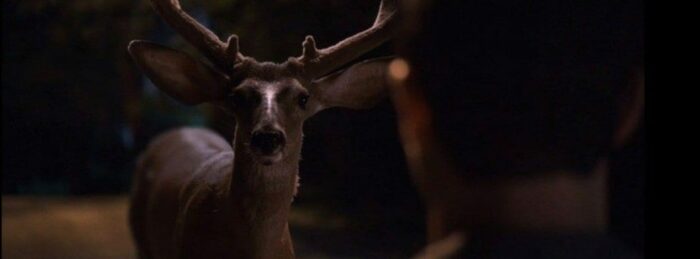
So Kevin is constantly at odds with himself, in seeking a stable family life that allows him to move on from his past trauma, but also in wanting the nihilism the Guilty Remnant represents.
Kevin, when he exits the bathroom, sees a wardrobe with an epigraph: “Know First Who You Are, and Then Adorn Yourself Accordingly.” This is a quote from the philosopher Epictetus, a stoic philosopher who believed self-knowledge to be the foundation of all philosophy, a common belief among ancient Greek philosophers rooted in Socrates’ “Know thyself” and later Aristotle’s “Knowing yourself is the beginning of all wisdom.” Inside the wardrobe are four potential outfits: 1) a priest’s vestments, including a sash with symbols for Alpha and Omega; 2) a plain white shirt and pants, representing the Guilty Remnant; 3) a black tuxedo with a white button down shirt; 4) a policeman’s uniform. Kevin examines each item in the wardrobe before settling on the third option, the black tuxedo.
Once dressed, there is a loud burst of static through the television screen, followed by the sound of a fire alarm. There’s soon a knock on the door, a special delivery for a Kevin Harvey (not Garvey), consisting of flowers and a card to “Get Well Soon.” The deliveryman quickly and violently attacks Kevin, who kills him in self-defense.
I want to note the color of the tuxedo worn by Kevin, as the significance of wearing a white shirt represents that underlying nihilism of the Guilty Remnant: “there is no family.” More on that later.
Fly, My Thoughts, On Wings of Gold
It’s also at this point we’re introduced to the recurring musical motif of the episode, a clip from Verdi’s Nabucco opera, “Va, pensiero” otherwise known as the “Chorus of the Hebrew Slaves.” This motif starts and stops abruptly several times in the episode, demarcating whether or not Kevin has made progress. The stark strings at the beginning of the arrangement denote the absurdity of Kevin’s situation. He has arrived in this place without rhyme or reason and determined to dress himself while not understanding the assignment, after which an attempt is made on his life. The strings act almost as an indicator of Kevin’s horror. They hit for the first time as Kevin attempts to use an elevator after exiting his room, but a fire alarm prevents the elevator’s usage. Going down will not be so easy.
Kevin descends a staircase and catches a glimpse of a small girl (Darby Camp) standing at the edge of the hotel pool. He arrives at the level of the hotel lobby, taking note of a bird that seems to be loose inside. The bird here relates to an earlier story told by Erika Murphy (Regina King)—she would capture and bury a bird, placing it in a box underground. After three days, if the bird were miraculously still alive, she would be able to make a wish. This was sort of a play on Schrödinger’s cat, the thought experiment in which a cat is placed in a box with poison and could be considered both dead and alive at the same time until an observer opens the box to collapse the wave function. Birds also represent transformation here; at the beginning of the season, we were treated to an incredible “origin myth” sequence, in which a pregnant cavewoman is cut off from her tribe via a cave collapse; in the distance she sees and hears a hawk—more on that in a moment, because we’ll hear the call of that hawk again.
Kevin is directed to the concierge, whom “all deliveries are routed through,” only to find that its Virgil, the man who set him on this course of action. Kevin conveys his memory of going to Virgil’s trailer and drinking poison in the previous episode; Virgil directs Kevin to meet with him in the parking garage in five minutes. He also hopes the bird doesn’t get caught.
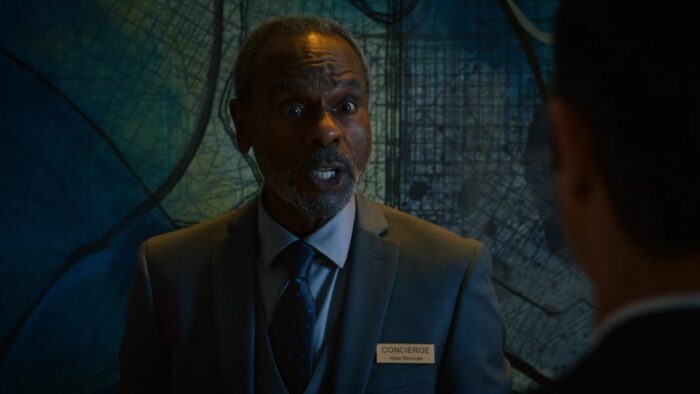
Kevin begins to descend down the stairs further and sees the little girl who had previously been beside the pool now face down, drowning. Unbeknownst to Kevin, this girl is Patti, but he won’t learn this until much later. He runs to the pool and gets her out, performing CPR (here he bears a strong resemblance to Jack Shephard in LOST; they’re even dressed the same) to rescue her.
If he’d let her drown, would this all have ended? Did Kevin’s toxic hero complex doom him to continue? Did Patti count on Kevin’s toxic hero complex to allow this to continue? A man (Gary Basarada) berates the little girl, telling her she should’ve known better because she can’t swim. Kevin responds that the little girl could’ve drowned, to which the man says, “Mind your own fucking business.” The girl waves to Kevin as the man carries her away.
Exactly Like the Godfather
Kevin proceeds to the parking garage as directed by Virgil, passing a couple arguing in Spanish; one of them appears dressed as a nurse. This is our first hint that Kevin is not the only one here to perform a task—others who have chosen their outfits from the wardrobe are about in the hotel. A car flashes its lights in his direction, and Kevin approaches and enters the vehicle. Virgil is in the drivers seat and lays out the rules of this place:
Virgil: No matter what, don’t drink the water here.
Kevin: And where is here?
Virgil: You mean the hotel?
Kevin: No, it’s not a fucking hotel. Someone just tried to kill me.
Virgil: Oh.
Kevin: Oh?
Virgil: Well, it makes sense. It’s a pitfall of your chosen occupation.
Kevin: Which is what?
Virgil: Look at the way you’re dressed, man. You’re an international assassin.
Kevin: Are you fucking serious?
The outfit choice in the wardrobe determined the terms of the battle. Had Kevin chosen another option, the terms would’ve been different. The options that had been available carry their own weight—the priest may not have been able to vanquish Patti, or the task may have been more like an exorcism; the white apparel may have easily succumbed to Patti or attempted to overthrow her within a version of the Guilty Remnant; the police officer is most closely aligned to Kevin’s identity in the past, but his current psychology may not have allowed him to embrace such an identity—it’s not possible to return to a properly ordered universe like that represented by the policeman identity. Rather, Kevin has chosen a common male power fantasy, the James Bond archetype.
Dress a man in a tuxedo and he’s likely to strike a Bond pose. This archetype is beyond iconic—the lone gun spy with no attachments beyond the mission, who is capable and ruthless, that women want and men want to be.
To Kevin, this situation is absurd. “His indignation has its comical aspect,” as Camus would say. “But it also has its fundamental reason.” To Camus, “the magnitude of the absurdity will be in direct ratio to the distance between the two terms of comparison” (The Myth of Sisyphus, p. 29-30). The difference between a concrete reality that Kevin can grasp and the metaphysical one in which he finds himself, ensconced within a male power fantasy archetype, underscores the absurdity. Within this context, his character’s fortitude and willpower will be tested. He must accept the absurdity because the only way out is through, and time is short and Virgil underscores the urgency of the situation: complete the mission, assassinate your target, “and you will be delivered from this place.”
Virgil explains that, in this place, Patti is running for President as the candidate from a Guilty Remnant party. Kevin is checked into the hotel under the alias Kevin Harvey—he’s made a generous donation to Patti’s campaign, which grants him a meeting and photo op with her. Once he goes to the meeting, he should excuse himself to the restroom, where he’ll find a gun in the toilet, which he should then use to execute Patti. “Like in The Godfather?” Kevin asks. “Exactly like the Godfather,” Virgil replies with a wry grin. (Kevin will later refer to The Godfather Part II as his favorite movie in the sequel to this episode.) Virgil directs Kevin to return to his room until the meeting because the Guilty Remnant will be crawling all over the hotel, so it’s not safe.
At this point he sees members of the Remnant pull into the garage in a white truck, led by the deceased Gladys (Marceline Hugot) who was stoned to death in Season 1.
No One Knows for Certain
Let’s take a step back for a moment and examine the situation. What is Patti? What is the hotel? In the precursors to this episode mentioned at the beginning of this essay, characters found themselves in alternate realities or abstract dimensions that could have been explained away as actual places, afterlives, or existing entirely within one’s mind. We should consider the same here—Kevin could be crossing to another plane of existence, or this could all be happening in his head, a final hallucination before death. Bardos are often explained as karmic hallucinations at the moment of death. In Twin Peaks, Albert Rosenfield (Miguel Ferrer) once described Killer BOB as “the evil that men do,” and David Lynch once expounded that he saw BOB as an abstraction in human form. Patti serves a similar function—she is an abstraction, a representation of Kevin’s guilt and self-loathing. In the previous episode, Kevin’s psychologist ex-wife explained her as such:
“When the mind is in emotional distress, it will grasp at any construct that makes it feel better… And now you are manifesting the leader of that cult because you need someone to turn it off. There is no Patti, Kevin. There is only you.”
But what Lindelof and his co-creators have done is make the question of whether or not Patti (or even the world of this hotel) is “real” completely moot. What these types of afterlife/liminal space storylines do, when employed properly, is explore a character’s inner conflict and spiritual turmoil. It allows us to dive within and externalize those abstractions. Often, such stories are derided for lacking stakes since they are “not real” (forget for a moment that we’re dealing with fiction where stories are not real by definition). But this story has very clear stakes, forward momentum, and a set of rules the characters must abide by. Kill your target, don’t drink the water, avoid the Guilty Remnant. There is an objective, and Kevin must move toward that objective. Reality or non-reality means little in this context.
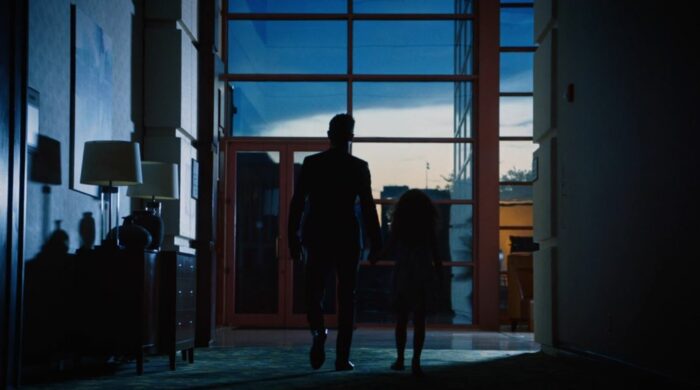
The hotel, whether it’s an afterlife or a hallucinated construct, is a liminal space in which a person must adorn themselves with what little self-knowledge they may have acquired, accomplish their abstract task, and return to life or perish. Kevin’s task is to exorcise this abstract manifestation of his guilt and nihilism in order to persist with living. “Let us again insist on the method: it is a matter of persisting,” says Camus. “At a certain point, man is tempted. History is not lacking in either religions or prophets, even without gods. He is asked to leap. All he can reply is that he doesn’t fully understand, that it is not obvious. Indeed, he does not want to do anything but what he fully understands” (The Myth of Sisyphus, p. 52-53).
Windex In Your Eyes
Kevin returns to his room and checks the wardrobe again, but this time only a replacement “Assassin” tuxedo is available. He had been drenched in the pool since rescuing the little girl, so he takes the opportunity to change into dry threads. A static burst erupts from the TV once again, and this time we can clearly hear the voice of Kevin Sr. (Scott Glenn), but the fire alarm interrupts again as well. Outside his room, he sees the man with the little girl again. Kevin suggests that they evacuate, but the man quickly dismisses it as a false alarm.
“But what if it’s not?” asks Kevin. “Then we’ll fucking burn.” An ominous statement to make when teetering on the edge of the afterlife.
Kevin evacuates and again sees the nurse arguing in Spanish with someone else, indicating an attempt to complete a challenge—this one involving a biohazard cooler that may have a heart inside. Kevin spots a deliveryman carrying balloons, which he thinks are for him, but the deliveryman says they’re for Mary Jamison (Janel Moloney), who is Matt Jamison’s incapacitated wife. Much like the bird loose in the lobby, this suggests someone else in Jarden who is in this liminal, intermediate space… though it’s never addressed after this episode. Kevin follows the deliveryman, but he’s soon accosted by the Guilty Remnant.
The Remnant overwhelm and assault Kevin, bringing him before Gladys and strapping him to a chair. They connect Kevin to a lie detector with a red lightbulb that illuminates when Kevin lies. Each time Kevin lies, a member of the GR uses a spray bottle on his eyes. This is a curious method of torture—if indeed eyes are the window to the soul, then Kevin needs Windex.
When asked for his name, he replies with Kevin Harvey, which earns him his first round of Windex to the eyes. He states his name as Kevin Garvey.
Gladys: You checked into the hotel under a different name. Why?
Kevin: Because I don’t want anyone to know who I really am. [NO LIES DETECTED]
This begs the question: who is he really? Beneath the machismo of the Assassin power fantasy, he’s a man who’s hurting, but he doesn’t want anyone to see his vulnerability. He’s been hurting since before the Sudden Departure, but that put him in a state of grief. He went from a stable family life with Laurie, Jill, and Tommy, to watching a woman he offhandedly decided to fuck disappear before his eyes. His wife left him, his father went mad, the whole world fell apart. As Patti will later say, “Because on October 14, attachment and love became extinct. In an instant, it became cosmically, abundantly clear that you can lose anyone at any time.” But this isn’t just true about the Sudden Departure—that’s true about death and divorce and the nature of reality. The Sudden Departure just put that truth into sharper focus.
Kevin: I just really want to be in the same room as [Patti]. [NO LIES DETECTED; this could be because he wants to assassinate her or because he really wants the guilt and nihilism offered by her]
Gladys: You want to be in the same room with her?
Kevin: Mm-hmm.
Gladys: Uh-huh. Do you smoke, Kevin?
Kevin: Yes.
Gladys: Why do you smoke?
Kevin: Because I’m addicted to nicotine.
This sets off the buzzer, triggering another round of eye Windex. Remember that smoking is closely associated with the Guilty Remnant. When a character smokes, they are aligning to the GR’s purpose, as shown by Kevin’s next answer.
Gladys: Why do you smoke?
Kevin: I smoke to remember.
Gladys: Remember what?
Kevin: That the world ended. [NO LIES DETECTED]
At this answer, Gladys frees Kevin and thanks him for his support.
God’s Tongue
After returning to his room, the television again bursts static, and the voice of his father finally comes through loud and clear. This is the only time when someone not dead or incapacitated communicates with Kevin while in the hotel, and the means of that communication seems to be fire. The classical elements, earth, wind, fire, and water all play special roles in this place. Water, which traditionally represents life, represents forgetfulness and true death. Fire, despite the ominous reference to burning, is a tool of communication—each time the fire alarm has gone off, the television loudly acted as a receiver; Kevin’s father was trying to reach him. Air, with the multiple references to birds, represents transformation. Finally, earth is the passage to rebirth.
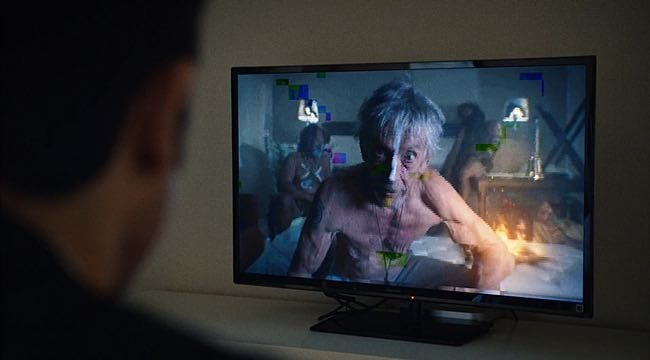
Kevin Sr. can be seen on the hotel’s television screen. He appears to be in a hotel room identical to his son’s, and someone in the background has a fire burning on the bed. Kevin Sr. loudly directs him to “keep that fucking fire going.” He says that he was responsible for the delivery, along with a card that said, “Get her to the well!” (The card said “Get Well Soon.”) He also claims to be in Perth, Australia, “fucked up on this shit they call God’s Tongue.” (This story is famously parodied in an episode of The Good Place, a comedy about the afterlife heavily inspired by LOST and The Leftovers.)
Kevin Sr. reiterates that Kevin must get her to the well, which Kevin does not understand. However they are able to say they love one another before the communiqué breaks down. Senior also notes that Kevin is “not a fucking assassin.” This is not necessarily an indicator the Kevin chose the incorrect apparel, but that Senior may not recognize who Kevin needs to be to complete this metaphysical assignment. We’ll see the other uniform/occupations in the episode at key moments, suggesting psychological indicators in Kevin related to his mission or his inner state of mind.
After the inter-reality communication with Kevin Sr., the Guilty Remnant arrives to retrieve Kevin for his meeting with Senator Levin (Patti). We should also note that it’s never confirmed Kevin Sr. experienced the other side of this communication; in the season three episode “Crazy White Fella Thinkin’,” Senior confirms that he did take God’s Tongue while in Perth and woke up in a hotel room two weeks later, but doesn’t mention anything about talking to his son. At times, the show seems to take the position that this truly is the afterlife and the absurd events happen, but other times it seems to take the position Kevin imagined it all because it’s so specific to Kevin’s inner life. No surprise that Lindelof and his co-creators prefer to “Let the Mystery Be.”
Accept My Truth
Kevin is led through the halls of the hotel. He sees a man being led past him with a black bag over his head, dressed in Kevin’s police chief uniform. This represents the submersion of Kevin’s law and order identity as he moves toward the cold blooded completion of his task.
Before meeting with Senator Levin, Kevin is patted down by security. The security guy humorously congratulates Kevin on the size of his penis, a joke which will recur in the sequel to this episode in season three. Aside from being a funny dick joke about Theroux, this is another part of the male power fantasy/International Assassin archetype. Kevin, identifying himself with the archetype, sees himself as having an impressive hog, so the other shades in this world see it too. Contrast this to the “real” world where Laurie (in the season three episode, “It’s a Matt, Matt, Matt, Matt World,”) mentions that Kevin is just a normal man from someone who lived with him for fifteen years. (Admittedly, this isn’t about his dick, but more about Laurie’s impression that she refuses to believe he’s the second coming of Christ.) Because this is all happening in this intermediate state, the jokes about dick size likely match an internalized/idealized view of Kevin’s masculinity.
The security guy also says to “make like Jesus,” foreshadowing the third season storyline around Kevin as a messianic figure after his return from this world.
Gladys preps Kevin for his meeting, at which point Kevin asks to use the restroom to retrieve the gun, as directed by Virgil. Gladys asks if Kevin is thirsty, again, which she also asked during his lie detector interrogation. He refuses both times, but in the lie detector scene, the buzzer went off indicating he was thirsty. That thirst means he wants to drink the water—part of him wants to forget and stay here, stay dead. It’s also a Guilty Remnant character tempting him with water, meaning the part of him that aligns to the GR philosophy is the part yearning for death.
In the bathroom, Kevin is unable to retrieve the gun because Holy Wayne (Paterson Joseph) is on the toilet. In the season one finale, Kevin was there when Wayne passed away in a bathroom stall. Wayne calls out the coincidence, feeling as though he and Kevin have met before, in a bathroom no less. He notes the feeling of deja vu:
“That’s the mind taking an event you’re experiencing in the present moment and mistaking it for a memory. The mind…” Wayne laughs. “You cannot trust the mind, for it will play tricks on you. And we all know who tricks are for.”
Again, this is calling into question the reality of what we’re seeing. Is this the afterlife or all in Kevin’s head? Wayne also laughs about this while drinking a glass of water, both indicating his forgetfulness and tempting Kevin to quench his thirst.
Kevin again attempts to use the restroom, but is stopped by the arrival of Senator Levin. The conversation again digs into Kevin’s subconscious support of the Guilty Remnant cause.
Senator Levin: I don’t know if Gladys told you, but we received credible intelligence that someone may be trying to assassinate me. Now why do you think someone would want to do that? Murder me?
Kevin: Well, I don’t know.
Senator Levin: It’s because I stick to you, Kevin. Throughout history assassins have never been motivated by money or revenge. They’re motivated by beliefs. And their targets embody a belief that enrages their would-be assassins. Why? Because secretly, they share that belief. John Wilkes Booth loved black people. Hated slavery. Hated it. Did you know that?
Wayne: I did not, Senator.
Senator Levin: Well, he did. But he still popped Lincoln right in his stovepipe. Bang. Emancipated from life. So I’m gonna ask you again. Why do you think someone would want to kill me?
Kevin: You tell me.
Senator Levin: Because they’d rather put a bullet in my head than accept my truth.
There’s not much, if any, truth to Patti’s assertions about assassins. It’s more important that it sounds like it could be true, and that it is definitely true in Kevin’s case.
Kevin: And what is your truth?
Senator Levin: Well, shit, Kevin, you wrote me a check for $50,000. What do you think my truth is?
Kevin: You want to destroy families.
Senator Levin: Write that down. That is fucking brilliant.
There’s a running in-joke in season two that audiences in season one didn’t understand the belief system of the Guilty Remnant, but Kevin distills it down to its fundamental root. “Our polls say our message is confusing. You just nailed it,” exclaims Patti. She expounds upon how love and attachment went extinct on October 14th, that it became abundantly clear you could lose anyone at any time. But in our exploration of the absurd, we’ve established that that’s abundantly clear even without the Sudden Departure. People die and people leave, sometimes without rhyme or reason, just as with Meg’s mother in the episode that immediately follows this one, “Ten Thirteen.”
To be attached and to share your life with someone, with a family, is to be vulnerable—it contradicts the lone gun of the James Bond archetype. When that someone or that family is gone, the silence left behind is deafening. That plays directly into the GR’s penchant for not speaking: the absence of sound, of voice, or people; the emptiness where someone used to exist; and the response of the universe when we ask why. In grief, it’s natural to wish we’d never made the attachment, as only pain and silence is left behind. Just as Laurie said in the previous episode: “Because their brains would sooner embrace magic than deal with feelings of fear and abandonment and guilt. And all of us turn to someone who could just turn it off. Why do you think I joined a fucking cult?”
But to reject attachment completely to avoid the pain of losing others is to embrace nihilism. It’s the joke Meg (Liv Tyler), a member of the GR, tells Evie Murphy (Jasmin Savoy Brown) in “Ten Thirteen.” “Knock knock. Who’s there? Broken pencil. Broken pencil who? Forget it, it’s pointless.” It’s an acknowledgment of the emptiness of human existence, it’s losing to the absurd condition and choosing either physical or philosophical suicide.
Patti then relates an anecdote about a baby that was given to her (much like Kevin and Nora were given Lily at the end of the first season), but that the baby would be fine. It would grow up with difficulty attaching and loving people, which was no longer a weakness, but a strength. She connects this back to the incredible season opening with the cavewoman, the origin myth of The Leftovers:
“Our cave collapsed, Kevin. Now, we can spend all our time digging through the rubble looking for signs of life, or we can transform.”
In the cavewoman sequence, her cave collapsed behind her, separating her from her tribe (and most likely killing them). She gave birth to her baby, and then determined she would need to move on and find another group of people. She saw a hawk in the sky and a column of smoke in the distance, indicating another tribe. On the journey toward the smoke column, she climbs a tree to take eggs from a bird’s nest for food. On the ground, a snake slithers toward her baby. She rushes back down to rescue the baby, but the snake bites her. She carries the child as far as she can, but collapses on the way, succumbing to the snake’s venom. The hawk soars overhead, it’s cry piercing the silence. The newborn can’t move and will die… except that a woman from the other tribe discovers them and rescues it.
There’s a clear parallel in the two stories, that told by Patti and that shown at the beginning of the season. The key difference is that in the one we’re shown, the woman dies, and in Patti’s allegory, she says we can transform. There’s more of this story to come later in the episode—for now, simply note this point between death and transformation, which is also underscored by the call of the hawk.
Kevin finally has the opportunity to use the restroom before the photo op, at which point he finds the gun taped under the toilet, complete with a silencer he must screw on the muzzle. He walks out and immediately shoots Wayne and Gladys, but he hesitates with Senator Levin. Patti claims that she’s a body double, a decoy that they found on Facebook and altered with surgery. Kevin says goodbye and shoots her square in the forehead.
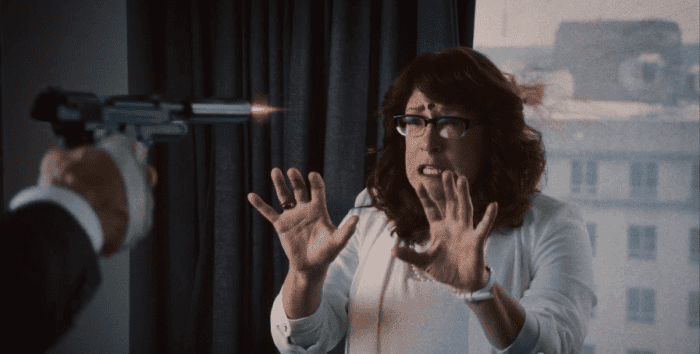
He waits to be delivered from this place, closes his eyes, and… nothing. The heavy strings of “Va, pensiero” play loudly as he opens his eyes. He’s still here. The game is still going.
Kevin gets on an elevator with a priest wearing the same vestments that were in the wardrobe, complete with the Alpha/Omega sash. The priest is crying. This represents Kevin’s spiritual malaise as the task is incomplete, even though he has betrayed his law and order identity to fulfill it.
Why Am I Still Here?
Since he perceived the mission to be completed and for some reason he’s still there, Kevin makes his way back to the concierge desk back in the lobby to find Virgil. However, Virgil no longer recognizes him. The chirping bird that had been trapped in the lobby lands on Virgil’s desk, and he smashes it with a book. This is is a big change from the Virgil who hoped they wouldn’t catch that bird. “Did you drink the water?” asks Kevin. “I was so thirsty,” Virgil responds. The bird has been killed, the transformation halted. Kevin no longer has a guide and must figure out the remainder on his own.
Desperate and directionless, Kevin returns to his room, but finds himself locked out. The man who had been in the next room with the little girl Kevin saved from drowning sits out in the hall with a bottle of liquor. The man offers Kevin a drink. Since this is not water, it appears safe for him to imbibe. Kevin confides in this man that he’s an international assassin, but he’s done for the day.
The man replies, “Wow, international assassin. You get to travel the world killing people. No consequences. No wife. No kids. No responsibility. That’s a great job. I can see why you picked it.”
Once again, the lack of attachments is pointed out in regard to this archetype. Kevin asks the man what he does for a living, to which the man responds, “I don’t do anything. I’m fucking dead. Half the people, they can’t even remember their own names. The other half, they’re running around doing crazy shit like international assassins. And I can’t find a single woman to take a dump on me.”
That last line provides Kevin with just the right information to recognize the man before him. It’s Neil, Patti’s ex-husband, a serial philanderer with a fecal fixation. How the real Patti’s obsession with the end of the world began was in learning about her husband’s activities and then leaving him. She had been Laurie’s patient before the Sudden Departure and then her cult leader after. Now it’s less about targeting Patti, as he had been told to do, and more about empathizing with her. This is the asshole that hurt her, that led to her cult life, that led to her suicide, which ultimately traumatized Kevin.
Kevin: “That little girl in the room is not your daughter, is she?”
Neil: “Oh, you think there’s a little girl in my room?”
Kevin thrashes Neil, strangling him and then snapping his neck. (Fun Easter Egg here is the design on the carpet, which is a similar design to the Overlook Hotel from Stanley Kubrick’s The Shining.)
Neil seems to have been immune to the forgetfulness of the water since he only drank liquor. And he probably didn’t care about completing any task or putting on clothes in a wardrobe. And the last thing about Neil is that he disregards Kevin’s assertion that there’s a little girl in his room, seeing through Patti’s disguise.
With Neil dead, the little girl opens the door. Pinned to her chest is a piece of paper. Written in black magic marker are the words, “I need to keep my mouth shut.” You can feel the wind knocked out of Kevin when he sees. It’s the moment where Kevin finally comprehends that, beyond this cultish figure with a deeply nihilistic philosophy who in life wanted to wound him and in death wants to torment him is a whole person. She had been a child, she had been a wife, she had been a deeply hurt human being who didn’t deserve the treatment she received by an indifferent and often painful world. None of us do. Kevin had been someone who tried to maintain the balance, who believed in law and order, but that’s not the reality. And now, to get out of this place and back to his own life, he’ll have to act, not dispassionately toward a target, but with empathy and understanding. Just as Patti had written when she died: “You understand.” At the time he didn’t, now he has to. And in doing so, is he aligning himself with the forces who hurt and abused her?
Kevin brings the little girl down to the concierge desk and asks Virgil if there’s a well nearby. Indeed there is, in Jarden, Texas, a straight shot down I-55. “He’s going to throw me in,” she says. “Well, then I hope you have your swimsuit with you, young lady,” Virgil responds jokingly. Kevin and the little girl Patti leave the hotel, night appearing to descend outside.
Axis Mundi
In the car on the way to Jarden, little Patti reads from a tourist pamphlet they picked up from Virgil about the well, dubbed The Orphan’s Well, built by indigenous peoples of the Americas:
“According to the ancient legend, the well formed a conduit between the world of the living and the spirit world… For centuries, people have made pilgrimages to the well to throw in whatever they want to unburden themselves of.”
The season premiere episode that featured the cavewoman was titled “Axis Mundi,” a Latin term that represents the connection between heaven and earth. The idea is that Jarden represents some type of conduit between the material world and the spirit world, just as described by the Orphan’s Well pamphlet. Though it sounds like Lindelof discovered this concept after LOST, the Island on that show certainly seemed to fulfill this concept as well, a miraculous, earthly location that seems closer to the other side than anywhere else on earth. Indeed, on LOST, several characters could communicate with the dead, just as Kevin communicated with Patti’s ghost, and just as with Kevin, they were interpreted as mentally ill.
I’ll also note that the well must be named for the cavewoman’s offspring, who would’ve been an orphan to the indigenous tribe that found it. But did the cavewoman and her orphan child exist in the real world or the spirit world (or both)? After all, the well only appears to exist in the spirit world—there’s no well in the material Jarden. And maybe this hotel world is on one side of the conduit, closer to the material world, and there’s something else when someone dies a second death or passes through the other side of the conduit. This is all speculation. There was a similar distinction in LOST, where some spirits seemed locked on the Island, unable to move on, while the Oceanic Survivors passed through the Flash-Sideways in their way to what’s next.
This also points to the difference between death and transformation in Patti’s allegory. The story of the cavewoman, her orphan child, and the cave collapse happened at this location, on the banks of Jarden, Texas. The inference we should make is that the outcome of this story somehow created the conduit between heaven and earth. Perhaps in creating this well and paying tribute to the orphan child and its mother, the indigenous tribe created the connection, or maybe that’s what we’re meant to think.
Kevin and Patti arrive at the bridge to Jarden, which looks very similar to the one in the real world, but there are barrels on fire blocking the way for cars. Perhaps the fire here represents long distance communication by one last dweller on the threshold. The driver’s side window suddenly breaks and Kevin is dragged through, a noose tied around his neck.
What If God Was One of Us?
David Burton (Bill Camp) is a curious character. At the beginning of the season, as we were getting introduced to Jarden and barely had our bearings, the strange man on the pillar in town gave an envelope to Michael Murphy addressed to David Burton and asked that it be sent to him in Australia. Michael said he’d take care of it. (Virgil noted that the man on the pillar was “a success story” in selling Kevin his plan to exorcise Patti.) Blink and you might’ve missed this interaction. Another blink and you might’ve missed it scene involved a news story playing in the background during the episode “Off Ramp,” describing an Australian man who claimed to come back from the dead, where he visited a hotel. We meet him here in “International Assassin,” again in the Season 2 finale “I Live Here Now,” and then in the material “real” world on a boat between Tasmania and Australia in season three’s “It’s a Matt, Matt, Matt, Matt World.” In that last episode, Burton claims to be God. On this side, he doesn’t give a name. He seems to have a similar story to Kevin, in which he cannot die, until, at least, the “Matt, Matt World” episode.
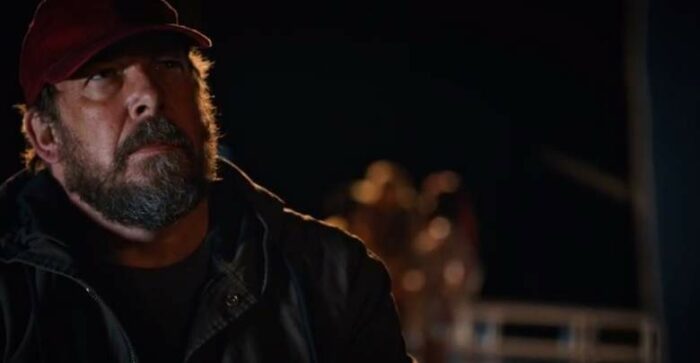
Here, Burton attacks Kevin, throws a noose around his neck, and ties the other end of the rope to the rail on the bridge. “Cross or jump,” he demands, brandishing a machete. Again, to be or not to be, the problem of suicide. And now, Kevin’s entire story is distilled down to this very simple choice. There are other ropes tied to the bridge, and the sound of rope straining and turning in the wind. Others have made the choice—they chose suicide, true death, the spirit world.
Kevin: Why would I jump?
Burton: Because you don’t want to kill a child.
Kevin: She’s not a child.
Burton: Yes, she is. And if you do this, it’ll change you.
Kevin: None of this is real.
Burton: Friend, this is more real than it’s ever been.
There’s a lot to unpack here. It’s important to note Burton’s assertion that Patti is a child. This can be interpreted a few ways: 1) Kevin, imagining this, thinks that Patti truly is a child or childlike; 2) Patti’s abuse from the world—her father, Neil, etc.—hindered her maturity and prevented her from growing, and instead she’s done nothing but lash out—apocalyptic fixation, cult behavior, suicide; 3) she is a whole person—every person is a child who grows to the person they will be—when you kill someone, you extinguish everything they ever were and everything they will ever be. Take your pick.
Next, Burton says that if Kevin goes through with this, it’ll change him. Again, this distills down the point that Kevin must transform or die. I’d like to return to the problem of suicide here for a moment. Kevin asserts that none of this real. What should it matter what they do here? The people who arrive here have faced the absurd and been confronted by this choice: transform or die. Others have made the choice, but there is no going back. You will have to live with what you do in this place to get back, and they have made the choice that life isn’t worth living, even after coming this far. Camus stated, “one kills oneself because life is not worth living, that is certainly a truth.” The life they would return to would not outweigh what they have to do to get it back. “Does (life’s) absurdity require one to escape it through hope or suicide—this is what must be clarified, hunted down, elucidated while brushing aside all the rest. Does the Absurd dictate death?” (The Myth of Sisyphus, p. 8-9). Would they be able to live with themselves, day in and day out, mechanically acting and working until the day they simply die again? Would the weariness overwhelm them, that they would have to act through the occupation, which is now writ upon their soul, for the rest of their lives, only to eventually give it all up again? There may not be a better illustration of the absurd and the problem of suicide than this and the series that follows hereafter. How can one be granted a glimpse of an afterlife, the possibility of a meaning to existence, but you can’t know that meaning, and now you must live the rest of your mundane life with that question in the back of your head?
“Weariness comes at the end of the acts of a mechanical life, but at the same time it inaugurates the impulse of consciousness and provokes what follows. What follows is the gradual return into the chain or it is the definitive awakening. At the end of the awakening comes, in time, the consequence: suicide or recovery.” —Albert Camus (The Myth of Sisyphus p. 13)
Kevin must transform or die. There is nothing else.
Burton states that “it’s more real than its ever been,” once again to diminish, from a meta-storytelling perspective, the idea that this type of liminal space tale is not as real as any other fiction, but also to enunciate the stakes for Kevin. You either live through this or you die, and that is, in clearest terms, the problem of suicide.
And David Burton serves as a cautionary tale, the man who lives through this absurdity and defines himself as God, for whom anything is permitted. Eventually that man gets his face eaten by a lion.
In the “Matt, Matt World” episode that follows the fate of David Burton, Matt Jamison confronts and converses with Burton. At a point in the discussion, Matt is no longer in conversation with Burton, but in conversation with God, regardless of whether or not Burton is God. And that’s how we should look at the events taking place in this sideways world. It doesn’t matter whether or not the hotel is the afterlife or the product of Kevin’s mind, the result is the same. Whether or not it is really a trial, it becomes a trial for Kevin.
And Kevin unties the noose around his neck, in defiance of the choice given to him. He will go through with it, and he will transform.
Burton whispers one last thing to him, which we won’t learn until the sequel to this episode. He says, “You are the most powerful man in the world,” which again underscores the male power fantasy aspect of Kevin’s personality and the danger presented by his survival—that everything is permitted, that one can define oneself as God (as shown by Burton himself).
“Va, pensiero” plays, and Kevin carries little girl Patti forward to the well.
All’s Well That Ends Well
It already appears to be close to dawn as they approach the well near the Jarden reservoir, the sky painted in light blue and pink hues. The act is clearly difficult for Kevin, as he sets Patti on the edge and faces her.
Patti: Do you want to drop me in or do you want to push me in? Pushing is probably easier. What’s wrong?
Kevin: It’s hard.
Patti: Why?
Kevin: Because I feel sorry for you.
Patti: Would it help if I closed my eyes?
Kevin: No.
Patti: Would it help if I say I deserve it?
Kevin: That’s not true.
Patti: Yes, it is. I talk too much. I don’t listen. I’m stupid. I’m worthless. I’m a fat pig. I don’t know how to be happy.
Kevin: Please stop, okay?
This experience has awoken a deep empathy in Kevin, now identifying strongly with the person who had been his tormentor. “Just like a woman. She believes she can improve you,” Burton said on the bridge. Kevin cries and pushes Patti into the well mid-sentence. He vomits immediately, and hears the far off call of the hawk. It’s the moment of transformation, the bird’s cry solidifying it.
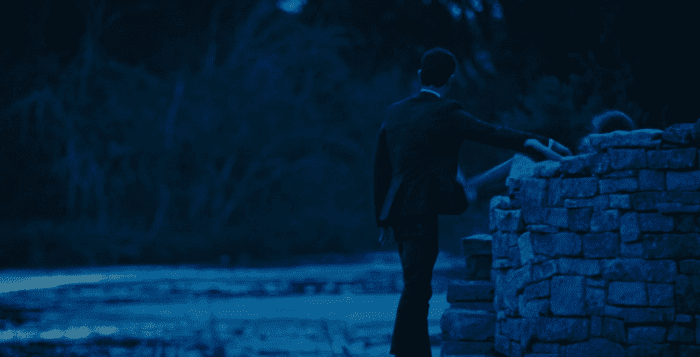
The elder Patti’s voice calls from within the well, “Kevin… please help me.” Simply pushing her into the well wasn’t enough. He begins climbing down the well walls until he slips and falls to the water below. Patti is here, battered and bloody, in her Guilty Remnant whites, just as when she’d killed herself. Kevin cradles her, just as he did then. She recounts the story of how she was on Jeopardy!, and learned the power of silence from the reigning champion she faced. It recalls the famous interaction between Don Draper (Jon Hamm) and Michael Ginsberg (Ben Feldman) on Mad Men: “I feel bad for you.” / “I don’t think about you at all.” She’d determined that she needed $50,000 to leave Neil, so she went on Jeopardy! to win it, and she did… but she stayed with Neil, even despite his philandering. A woman who would stay, despite that amount of suffering and abuse. And Kevin feels aligned with that abuse. As he says, he feels sorry for her, so this is hard to do. She confesses her fear, at which point Kevin pushes her under the water to suffocate. Water is again a symbol that contradicts its usual role in literature as life, here representing true death. Similarly, earth represents life and rebirth, as the well collapses and coalesces to Kevin, clawing his way out of the earth and back to the real world.
Michael Murphy emerges from the forest, shocked at seeing Kevin, alive and well. “Holy shit,” he says. End of episode.
What’s Next
The remainder of the series seeks to disentangle everything that happened here. Kevin Garvey would revisit the hotel world two more times, in the episode “I Live Here Now” at the end of the second season and “The Most Powerful Man in the World (And His Identical Twin Brother),” the penultimate episode of the series. He would continue living in Jarden as police chief with his longtime partner Nora Durst, until her brother Matt Jamison, together with John and Michael Murphy, authored “The Book of Kevin,” a gospel recalling Kevin’s experience in the hotel and his subsequent resurrection. This would drive a wedge between him and Nora, after which she would pursue a final answer to what happened to her family in the Sudden Departure. (Whether or not she found an answer, I’ll leave to you.)
The hotel sequence in “I Live Here Now” serves as an addendum to “International Assassin.” Kevin, after arriving back in Jarden, is immediately questioned by John Murphy, who thinks Kevin has something to do with the disappearance of his daughter. His rebirth triggers a somnambulant memory in which he saw Evie Murphy staging her disappearance as a member of the Guilty Remnant. As a result of how absurd this sounds, John’s anger causes him to shoot Kevin, who wakes up in the tub once again. The sounds of “Va, pensiero” play again. (The heavy burst of strings accompany Kevin screaming, “Motherfucker!” at the top of his lungs.) He declares he’s not doing this again.
But a calmness passes over his face, and he looks over at the wardrobe. Know First Who You Are, and Adorn Yourself Accordingly. He sees the same four articles of clothing that he saw before. He closely examines the tuxedo of the international assassin, when the Mapleton police chief uniform catches his eye. His name is on the badge. He’s re-embracing his belief in an ordered universe, and his role as a keeper of the peace within it. As soon as he puts on the police chief uniform, the phone rings. A man with an Australian accent says there’s someone being attacked in the hotel bar.
Kevin rushes down to assist, but finds no one being attacked; rather, there appears to be a game of spin-the-wheel karaoke taking place. Brilliant lights shine on the stage, and David Burton asks Kevin if he’d like to sing a song. He replies, no. A woman immediately jumps up to volunteer, spinning the wheel to land on “Angel of the Morning.”
Burton sits at the bar, sipping a drink. The song plays, and Kevin asks Burton what he needs to do. Why is he here?
Burton scoffs. “Why do you want to go back?”
Kevin: Because I have a family. Because I love them and I—
Burton: Yes, you love your family. It’s not your time. Still got so much to live for. Oh, come on, be original, mate. Why should you go back and the rest of us–
Kevin: Because I deserve to.
Burton: You deserve to?
Kevin: Yes. Now tell me how.
Burton: I already did.
Kevin: Excuse me?
Burton: If you want to get out of here, all you have to do is sing.
Kevin: I don’t believe you.
Burton: Why not?
Kevin: Because it’s stupid.
Burton: Ah, the trial, it’s beneath you. It’s not elegant enough. Too easy. You pushed a little girl into a well. You don’t want to sing?
I certainly can’t do justice in writing to the performance that follows. Justin Theroux, who is not a singer, gives an incredible, emotional performance of Simon and Garfunkel’s “Homeward Bound” intercut with flashes of Kevin’s life, finishing on an image of Nora smiling. He will always need to find his way back to Nora. After all, despite being mostly about heavy topics like grief and death and what comes next, The Leftovers is, more than anything, a love story.
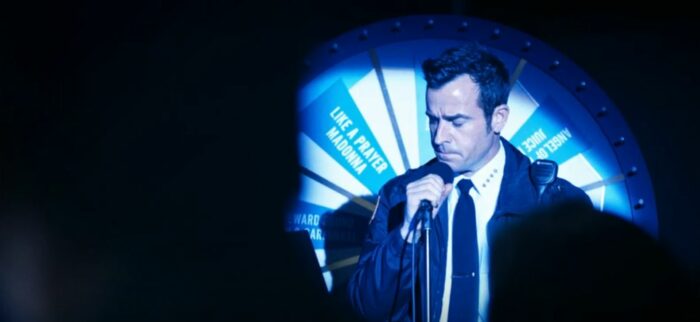
The Physical World
We’re three years removed from the beginning of a global pandemic we are still processing. Millions of people gone, worldwide. Most just want to move on while large swaths of the population deny it or disregard it. Families, friendships, relationships have dissolved as a result of the divide. We suffered a tragic, shared traumatic event that will have far-reaching ramifications for the rest of our lives. So many of us have sought escape, a way to turn it off. We’re looking for a way forward after such sustained absurdity. It’s no surprise apocalyptic fiction is again on the rise. We also need to cope with loss and properly grieve for what is gone.
The Leftovers is an incredible work of fiction concerned with how to carry on, how absurd the world can be when all we have is the deafening silence of those who’ve gone. We should consider the ways it seeks to externalize complex reactions to grief and guilt. In fact, in the years since its airing, we’ve seen plenty of successors to the style of “International Assassin” and The Leftovers, including The aforementioned Good Place, Lindelof’s own work on Watchmen, or that of Leftovers alums like Patrick Somerville on Station Eleven.
As we grieve and process the sustained traumas of recent years, it’s important to look within and examine the foundations of ourselves, to know who we are, and to ensure we don’t fall prey to the nihilism of our worst self-destructive impulses. Aristotle once said that knowing yourself is the beginning of all wisdom, and Camus dismissed this, saying that we will always be strangers to ourselves. Maybe it’s in the best interest of everyone to reflect on yourself with growing consciousness and meaningful self-awareness, to try not to be a stranger, instead working toward our best selves and not ceding to our worst. In “International Assassin” and beyond, Kevin was a stranger to himself, moving between identities as context dictated. Hopefully we can discover grace, just as Kevin did, transforming so we don’t wind up hanging from the bridge.
Grant Piercy is the author of I AM MERCURY and THE ERASED SAGA series of books. His latest book, GALAHAD, is an existential exploration of the classic Arthurian legend.

